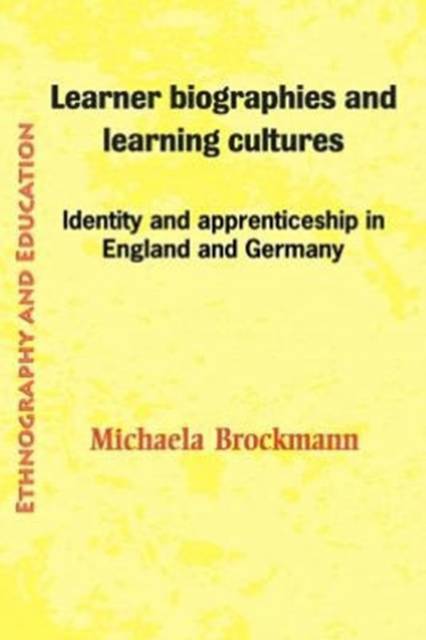
- Retrait gratuit dans votre magasin Club
- 7.000.000 titres dans notre catalogue
- Payer en toute sécurité
- Toujours un magasin près de chez vous
- Retrait gratuit dans votre magasin Club
- 7.000.0000 titres dans notre catalogue
- Payer en toute sécurité
- Toujours un magasin près de chez vous
Learner Biographies and Learning Cultures
Identity and Apprenticeship in England and Germany
Michaela Brockmann
Livre broché | Anglais
29,95 €
+ 59 points
Description
Learner biographies and learning cultures constitutes an important contribution to the under-researched field of vocational education and the school-to-work transition. Drawing on Butler's concept of discursive agency and Alheit's biographical approach, the book offers a new conceptual and methodological framework for exploring young people's construction of identity over time as well as in the specific learning sites of apprenticeship - the workplace and the college. The particular approach, concerned with young people's situated subjectivities, sets it apart from existing research, much of which focuses on social reproduction and portrays young people in vocational education as 'non-academic' with enduring identities. The comparative, multi-method ethnography is an in-depth study of sixteen apprentices in England and Germany, on two contrasting apprenticeship programmes-retail and motor vehicle maintenance. Bringing together a wealth of rich material, including young people's life stories and data from observations in workplaces and colleges, it paints a compelling picture of the individual young people as they negotiate learner identities over time, in multiple life domains and in the 'learning cultures' of the workplace and the college. The cross-national comparative design, contrasting the high-quality German dual system with the variable provision of apprenticeships in England, highlights the significance of discursive regimes in young people's identity construction. It is argued that learner identities are not natural or abiding, but are formed through concrete experiences of learning and constituted in institutional settings with discursive frameworks that prioritise certain forms of knowledge. The findings challenge one of the most common stereotypes of young people in vocational education in England today-that they are 'naturally' non-academic and that vocational pathways need to provide predominantly 'practical' training. The book is of potentially far-reaching impact in view of current government initiatives to expand apprenticeships and in the climate of high youth unemployment and rising university fees. The findings suggest that learner dispositions may change and that quality vocational education, based on the integration of theory and practice, can engage and challenge all learners across the range of 'achievement' levels, including those deemed 'disaffected' with classroom learning.
Spécifications
Parties prenantes
- Auteur(s) :
- Editeur:
Contenu
- Nombre de pages :
- 198
- Langue:
- Anglais
Caractéristiques
- EAN:
- 9781872767383
- Date de parution :
- 14-09-12
- Format:
- Livre broché
- Format numérique:
- Trade paperback (VS)
- Dimensions :
- 152 mm x 229 mm
- Poids :
- 272 g

Les avis
Nous publions uniquement les avis qui respectent les conditions requises. Consultez nos conditions pour les avis.






